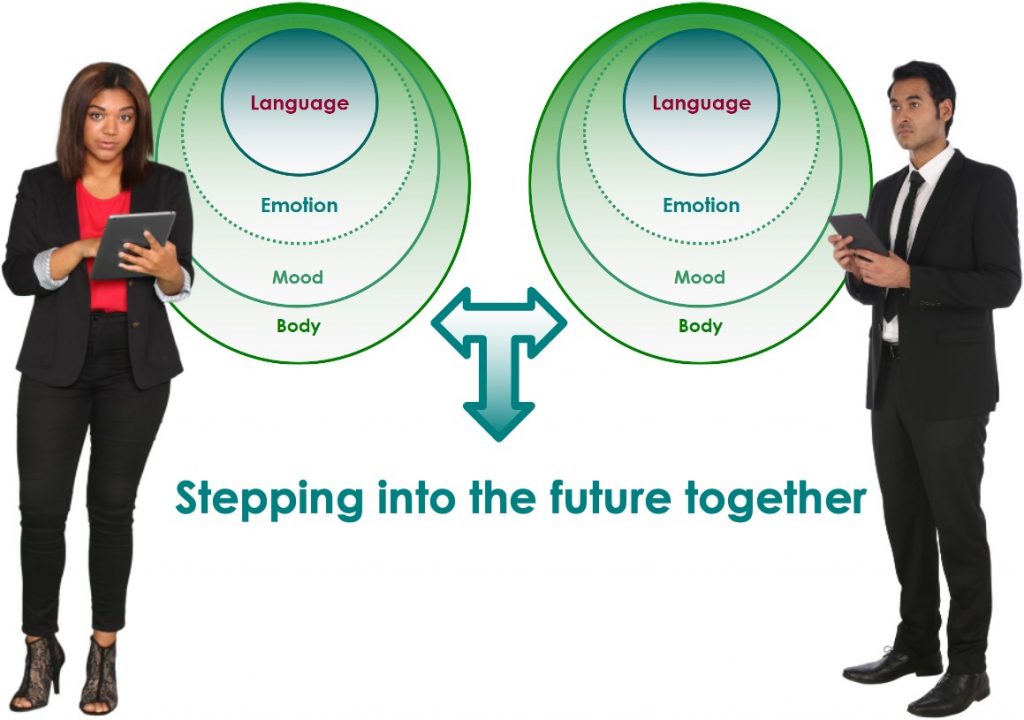
As we are always stepping into the future, we are constantly making predictions about what comes next. These predictions become our simulations, experience and actions. Either implicitly or explicitly as part of that process, we decide and act. We seek to create a future as we want it to be.
However, we do not do this in isolation; we are all doing this. We step into the future together. The result is often our decisions and actions can impact others and their future. If they let us do so, they give us authority and they are prepared to change their own desired future to fit with ours. It is this interplay that underpins all our relationships regardless of whether we know each other or not. For instance, we all relate to our political leaders, as they make decisions that will influence our future. They may not know us, but we relate to them. We not only relate to people, we also relate to entities such as governments and corporations. We relate to anyone or anything that seeks to impact our future.
To understand more about how we relate to each other, we can go back to the idea of the linguistic acts and authority.
Authority is central to the validity of the linguistic acts of declarations and assessments. In our relationships, we are constantly engaged in the question of authority as it relates to ourselves and others, so it follows that a better understanding of the distinction of authority is critical to enhancing our self-story, our identity and our way of relating to others. Authority also plays a role in the linguistic act assertions. We cannot personally determine whether every assertion made to us is true or not, so we often judge the authority of the source of an assertion when determining whether we believe it is true.
Authority is itself a declaration, although it is generally made transparently as a declaration or assessment is being validated. Rather than saying, “I will give this person the authority to make that declaration”, if we validate a declaration or assessment, we also declare that person’s authority to make it. Simply put, authority is a declaration of the right of yourself or another to author valid declarations or assessments that concern you. This does not always mean someone will like the declarations or assessments they validate, just that they accept them and the impact they will have on their future.
This view of authority as it relates to declarations and assessments makes it situational since it can show up as a question to be answered whenever we listen to a declaration or assessment being made. Do we accept the declaration or don’t we? Do we give the speaker authority or not? Either way, we subtly maintain or refine a very important dynamic in our relationship with the other person – the role their declarations and assessments will play in our life. As has been said, we tend to address this question transparently. We generally do not consider we are assigning authority to someone by validating their declaration or not giving them authority by invalidating it. Yet, this is just what we do thereby establishing a centrally important and often unseen dynamic of our relationships.
I have termed this, ‘The Authority Dynamic’.
This is a far from trivial matter. Declarations (and assessments) provide a powerful context for our future and as such play a significant role in shaping the future of our relationships and the world in which we will live. Hence, a better understanding and more conscious consideration of our declarations of authority will allow us to better design our future. An essential aspect to doing this comes with a greater awareness of whose declarations and assessments we accept and the circumstances in which we accept them. The reverse is also valid. We can identify our own authority with others on the basis of which of our declarations and assessments are accepted by them.
From a personal perspective, we can also examine the authority we declare for ourselves concerning our own declarations and assessments. This can be seen in a couple of ways with respect to declarations. Firstly, there are the declarations we make about our own lives, such as, “I will create and maintain a healthy body weight”. Are we speaking with authority when we make these declarations? In other words, are we committed to our declaration? Do we really mean it? It is also important to understand a declaration such as the one related to our weight involves significant future action and will involve making many similar declarations in the future if the initial declaration is to bear fruit. For example, every time we eat, we must decide what to eat and therefore we have to constantly look to our own authority to fulfil our declaration about a healthy weight. This is a critical distinction as, through any change process, we are seeking declarations from ourselves and others to create different outcomes or a different pattern of being.
The other aspect of the authority we give ourselves lies in how well we match our assessment of our authority with the authority others give us. It is not uncommon to observe people given authority by others, who do not exercise that authority or those who are not given authority by others yet who believe it exists. Such mismatches of authority play a significant role in the breakdowns we have in our relationships with others. People who do not accept the authority given to them by others may soon find themselves without it. People who give themselves authority not given by others often find themselves isolated. The effects of this can be dramatic in terms of one’s relationships and identity.

How do you think our subtle validation or invalidation of someone’s authority in declarations impacts the long-term dynamics of a relationship, and can this process be made more intentional without disrupting the flow of interaction? Regards Tel U
We notice patterns in life and create meaning and stories from those patterns. The stories about our interactions with someone provide the context for future interactions. Not many people really think about authority in the context of their relationships and conversations so we tend to simply fall into a pattern of interactions with someone. This is readily seen in parent child relationships where it can be hard for many adults to shift the nature of their relationship with their parents to be more adult to adult than adult to child. To answer your question, we are 50% of each of our relationships and, in principle, control our part of a conversation. An understanding of authority and someone’s underlying concerns can allow for more intent in how we relate to someone.